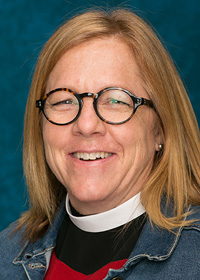Los Angeles project develops lay chaplaincy curriculum to open doors for more to servePosted Oct 25, 2022 |
|

Jessica Zheng offers tea to a visitor at one of her pop-up tea houses in a park through a program of the Center for Lay Chaplaincy in the Diocese of Los Angeles. Zheng is training to be a facilitator of the center’s curriculum. Photo: Jana Milhon-Martin
[Episcopal News Service] Priests and deacons interested in serving as chaplains in hospitals, prisons, schools and other institutions often undergo rigorous training in these specialized ministries. But degrees and certifications aren’t always required to provide pastoral care, nor do chaplains need to be ordained clergy to help people find spiritual solace during some of life’s most difficult moments.
The Rev. Jana Milhon-Martin sees chaplaincy as a call open to all, and for nearly two years, she has led a start-up initiative in the Diocese of Los Angeles, the Center for Lay Chaplaincy, that is developing and testing a curriculum for training lay chaplains to take on pastoral care roles.
Lay chaplains are not trained to substitute for clergy interactions with people in need, Milhon-Martin told Episcopal News Service. In intense settings like hospital trauma centers, skilled chaplains with more extensive training are indispensable. Rather, lay chaplains can play a vital role in responding to everyday pastoral needs in their parishes and the community, and “they bring a special kind of gift to that exchange.” This fall, Milhon-Martin, as the Center for Lay Chaplaincy’s director, is leading her fifth cohort of chaplaincy students, supported by $425,000 over three years in startup funds from Trinity Church Wall Street in New York.

The Rev. Jana Milhon-Martin. Photo: Diocese of Los Angeles
Milhon-Martin developed the idea for the initiative while working as a chaplain and clinical pastoral educator at Good Samaritan Hospital in Los Angeles, California. During the pandemic, many of the patients she counseled were homeless and receiving indigent care. In the most serious cases, she realized her role was “helping a lot of people die,” she said.
Providing comforting answers to questions about life and death is the gift of faith traditions like Christianity, she said. “Most people don’t spend any energy or attention rehearsing the meaning in their lives,” she said, and that is how chaplains can be most helpful.
At the same time, Milhon-Martin was hearing from many lay people who wanted to get involved but didn’t have a clear pathway to this kind of ministry. Chaplaincy training existed but didn’t always match lay people’s interests or availability.
Though chaplains often work in medical institutions, they typically aren’t licensed like doctors and nurses, and unlike clergy, who are ordained by their denominations, the process for becoming a chaplain isn’t as clearly defined and can vary from location to location. Even so, academic institutions commonly offer coursework in clinical pastoral education, also known as CPE, through accredited programs. There is no universal system of certification for chaplains, but several national organizations offer their own certifications.
Earning those certifications can be expensive and time-consuming, Milhon-Martin said, noting that CPE units require hundreds of hours of coursework. That may be justified when training highly skilled chaplains for their roles, but lay chaplains have fewer opportunities.
“It really is a privileged space,” she said. “The gate is so narrow, who can do this and who can’t.”
With the Center for Lay Chaplaincy, Milhon-Martin sought to widen those opportunities available to lay leaders while tailoring the training to their needs. Her 12-week course emphasizes helping lay chaplains be fully present while ministering to people.
“We’re trying to help lay leaders understand themselves and the ways they become reactive – emotionally, cognitively and spiritually – and develop a practice of reflecting on and being present to their own experience,” she said, especially in “highly anxious ministry contexts.”
She also wanted to expand the pool of candidates for lay chaplaincy. Often the lay people most available for these roles were retired. The training program that Milhon-Martin is developing caters to people with a variety of employment statuses, education levels, cultural backgrounds, languages and faiths.
In 2020, she applied for and was granted financing from Trinity Wall Street, which supports efforts to empower lay and ordained leaders through its Leadership Development Initiative. With a three-year cycle of grants, Milhon-Martin is able to cover personnel costs for the lay chaplain trainings and participants’ travel and meals, as well as the cost of hiring consultants to help draft and revise the curriculum.
Beginning in spring 2021, the initiative’s first year was one of discovery, as Milhon-Martin and participants considered how chaplaincy training could be adapted for different contexts. Each cohort of students was tested before and after they received the training, to gauge the effectiveness of the curriculum, which was reworked in response to the feedback.
Each cohort has averaged about a half dozen people. They gather for four hours at a time in mutually convenient locations depending on where the participants live. The coursework employs video and audio resources while not requiring any reading, though written resources also are provided.
Participants are trained to look inward before going out as chaplains to listen to others.
“The work is really about paying attention to our own feelings,” she said, “learning to identify the feeling they’re having and being able to name them in real time.” Then, by centering themselves, lay chaplains will be more prepared to listen with empathy to the people they meet.
As each cohort progresses, they are required to seek opportunities for providing pastoral care in their communities, in public places like subway stations, parks and homeless shelters. One student, for example, is Buddhist and has developed a pop-up tea house where she offers pastoral care in a conversational setting. The initiative is testing out similar hubs for community engagement under the banner of “Chaplaincy Everywhere.”
When the students return each week for their course sessions, they discuss with each other their real-world experiences. Once trained, lay chaplains will be encouraged to continue finding new ways to serve in public, Milhon-Martin said, such as with “laundry love” ministries and food pantries.
As part of the initiative, Milhon-Martin is developing a curriculum to train lay people to facilitate future courses. Two people are shadowing the sessions this fall as part of their training to become lay facilitators and receive stipends for their participation.
Once the Center for Lay Chaplaincy tests and finalizes its lay chaplaincy curriculum and facilitator curriculum, it will offer them to Trinity Wall Street’s Leadership Development Initiative to be posted online for anyone to download for free.
“The work that the Diocese of Los Angeles is doing to expand the roles of lay people within the many ways that the church minsters to the world is exemplary, and we are please to be able to support their innovative efforts,” Rob Garris, managing director of the Leadership Development Initiative, told ENS by email.
Milhon-Martin also is working with the Diocese of Los Angeles’ Commission on Ministry on a process by which lay chaplains who complete the program could be licensed for this work by the diocese. Such licensing would be separate from the certification process that CPE-trained clergy in the diocese follow, but it would give lay chaplains official backing as they serve in their own parishes or in their community.
“What has surprised me in this project is how hungry people are for this work,” Milhon-Martin said. “Of the four cohorts we’ve completed thus far, all of them have expressed a desire for the work and the group to continue.”
– David Paulsen is an editor and reporter for Episcopal News Service. He can be reached at dpaulsen@episcopalchurch.org.

Social Menu